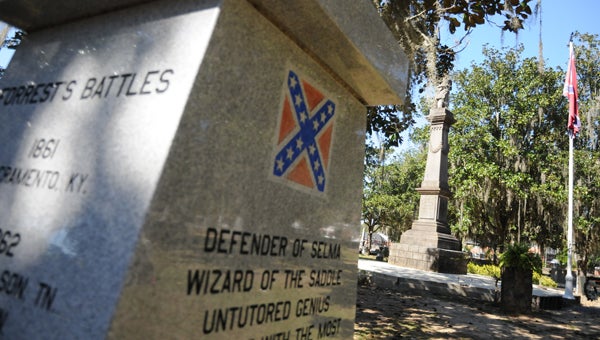One final step remains for council in KTK mining lawsuit
Published 11:09 pm Tuesday, December 10, 2013

The Nathan Bedford Forrest Monument, currently without a bust, sits on a one-acre tract of land in Old Live Oak Cemetery called Confederate Circle. In order for the lawsuit settlement against KTK to become official, the Selma City Council must approve an ordinance giving the land to Chapter 53 of the United Daughters of Confederacy. — Josh Bergeron
Though the Selma City Council already agreed, by a 5-3 vote, to a settlement in a lawsuit against KTK Mining, one more step remains.
The council must still pass an ordinance conveying a one-acre tract of land containing a monument to Confederate general and former Klu Klux Klan leader Nathan Bedford Forrest in Old Live Oak Cemetery to Chapter 53 of the United Daughters of Confederacy, according to city attorney Jimmy Nunn.
“Although we have voted that we agreed to settle the lawsuit,” Nunn said. “We still have to follow procedure. Any time a municipality gives a piece of land to another entity it must do it by an ordinance.”
The lawsuit began when the city suspended KTK mining’s construction permit on Sept. 25, 2012 after questions were raised about who owned Confederate Circle. The monument was originally unveiled in 2000 at the Vaughan-Smitherman Museum. It was moved to the cemetery after the monument was vandalized.
In March 2012, the monument’s bronze bust was stolen, leading to the group Friends of Forrest developing plans for relocation. Protests began again around the monument months after construction began. Shortly after the protests began city council members suspended the permit. They were later cited by U.S. District Judge Kristi Dubose for violating KTK Mining’s due process rights by not giving the company advance notice of the hearing on the construction permit.
“The undisputed evidence shows that the issues was raised for the first time at the September 25, 2012 council meeting,” Dubose wrote in the decision. “The issue was not included on the advance agenda for the meeting and KTK was not otherwise notified that such an issue would be raised.”
The settlement was approved at the council’s Nov. 26 meeting, with one council member — Ward 7 councilwoman Bennie Ruth Crenshaw — absent. In addition to passing the ordinance, settlement terms include: allowing KTK Mining to replace the bronze bust of Forrest, but not allowing the original plans to construct a taller structure; installing cameras and lighting for security; making the circle handicap accessible; placing a cannon on a pedestal previously intended to raise the monument’s height and paying a total of $100,000 to KTK Mining for a violation of the company’s due process rights.
The city is only required to pay a total of $50,000 of the damages. The city’s liability insurance will cover the other portion.
The ordinance for the land was introduced Tuesday, but not without some controversy. Crenshaw finally got an opportunity to publicly express her opinion on the settlement, by reading a prepared speech.
Crenshaw began by saying she didn’t believe the bust of Forrest was stolen, as previously stated. Instead, she said the bust was hidden in order to construct a taller monument.
“I truly believe this situation could have been resolved in court,” she said. “Is this the legacy that we want to leave our children? Until some of us change our mindsets, our children and our city will continue to suffer.”
She said a public hearing might have prevented public outrage stemming from the settlement decision. On three separate occasions, residents have been thrown out of council meeting for disorderly conduct and speaking out of turn.
“I do think that if we would have asked the people of Selma what they want, we would have gotten a different answer,” she said.
If Crenshaw had been present at the Nov. 26 meeting, the vote would have likely been 5-4 in favor of the settlement. Council President Corey Bowie, Ward 1 councilman Cecil Williamson, Ward 2 councilwoman Susan Keith, Ward 3 councilman Greg Bjelke and Ward 6 councilman B.L. Tucker voted in favor of the settlement. Ward 4 councilwoman Angela Benjamin, Ward 5 councilman Sam Randolph and Ward 8 councilman Michael Johnson voted against the settlement.
Nunn said the U.S. District Court has officially been notified that KTK Mining and the City of Selma have reached a settlement. He added there is still time for a council member to change their vote, but not without consequences.
“You have a choice to change your vote, everybody has a choice,” Nunn said. “The court could issue some type of order, the court could also request an appearance before the court, or the court could vacate the settlement stipulations and put the suit down for hearing. I don’t know how the judge would rule.”
The city council is scheduled to vote on the ordinance at its January meeting, as it does not meet again in December.
The city must also write a check for $50,000 to pay for damages. Nunn said the city council won’t be involved unless Mayor George Evans decides not to follow through.





